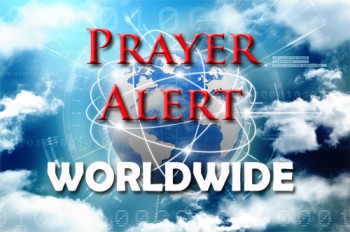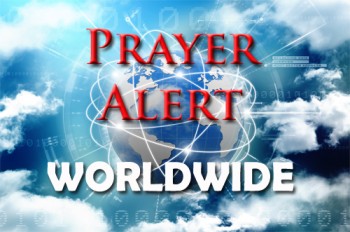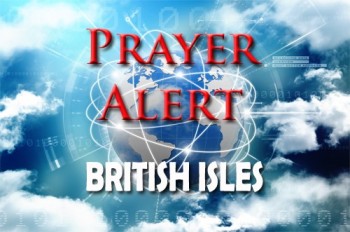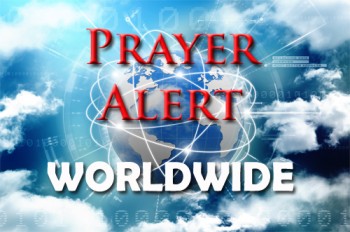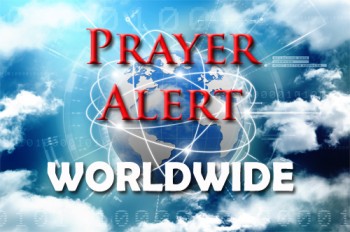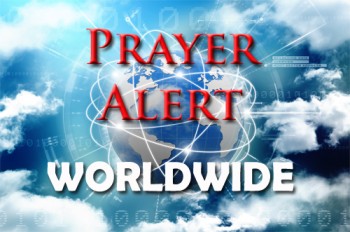Displaying items by tag: Asia
India: ‘murder’ by prayer
Three Christians stood in disbelief as police clapped them in handcuffs. They went to jail, simply for praying for a sick woman. Surjan, Kolah and Krishna had not been openly sharing the gospel in the streets, which would draw persecution. They had simply prayed for the sick wife of a friend. But the woman died, and the villagers blamed the three Christians who had prayed for her. 27-year-old Krishna had only been a Christian for a month. What would prison do to his young faith? In prison, guards called the three men ‘Hallelujah people’ because they met every morning for prayer and to encourage each other. As months passed, they shared the gospel with fellow prisoners. Thirteen became Christians. After eleven months a lawyer was able to get them released on bail. But they still face a trial. They may yet face a term in in prison for the crime of ‘murder’ by prayer.
Pakistan: Christian bride trafficking
Muqadas was 16 when her parents married her off to a Chinese man looking for a bride. A few months later, Muqadas is back home, pregnant, and seeking a divorce from an abusive husband. Hundreds of poor Christian Pakistani girls have been trafficked to China in a bride market that has swiftly grown since last year. Brokers aggressively seek girls for Chinese men, sometimes cruising outside churches to look for potential brides. They are being helped by Christian clerics paid to target impoverished parents in their congregation with promises of wealth in exchange for their daughters. Parents receive several thousand dollars and are told that their new sons-in-law are wealthy Christian converts - but this is not true. The Chinese government and its embassy in Pakistan are accused of turning a blind eye to the practice by issuing visas and documents without question.
Iran / USA: sanctions and sabotage
On 10 May US merchant vessels were warned of potential threats to commercial shipping and oil production infrastructure in the seas near Iran. On 13 May two Saudi oil tankers were attacked as they prepared to cross into the Persian Gulf. ‘Significant damage to the two vessels’ halted further movement. Meanwhile seven (Iran-backed) Houthi drones targeted two (US-backed) Saudi pumping stations along a pipeline carrying 5m barrels of crude oil a day; in response, the USA has deployed aircraft strike groups and B-52 bombers to the region. On 15 May Iranian newspapers reported that Tehran will resume higher nuclear enrichment (beyond the permitted 3.67%) in sixty days if no new agreement is reached about sanctions being lifted. The US embassy in Baghdad has ordered all non-essential and non-emergency staff to leave Iraq immediately, as tensions grow between Washington and Iran. See
Jeremy Hunt and Christian persecution
Pervasive persecution of Christians, sometimes amounting to genocide, is ongoing in the Middle East, according to a report commissioned by the British foreign secretary, Jeremy Hunt. ‘The report finds an ‘inconvenient truth’; 80% of persecuted religious believers are Christians. Some of the report’s findings will make difficult reading for Middle East leaders who are accused of tolerating or instigating persecution. The Turkish AK party is highlighted for denigrating Christians. Hunt, an Anglican, has made the issue of Christian persecution one of the major themes of his foreign secretaryship. ‘I think we have shied away from talking about Christian persecution because we are a Christian country and we have a colonial past, so sometimes there’s a nervousness there. But we have to recognise that Christians are the most persecuted religious group.’ The interim report sets out the scale of the persecution. A final report in the summer will state how the Foreign Office can raise awareness of the issue.
Israel: tensions in Tel Aviv
Many participating groups in 2019’s Eurovision Song Contest are already in Tel Aviv, with more arriving daily. The finale will be on 18 May, in the same week as Palestinians commemorate Nakba. This was 71 years ago, when 700,000 people left their homes at the time when Israel was born. Activists say the venue for the competition was built on land of a former Arab village which emptied in 1948. As anxiety mounts, the foreign ministry spokesman, Emmanuel Nahshon, said, ‘This is going to be a huge party with thousands of people participating, but we will remain extremely vigilant in order to make sure that no-one comes here to disturb and destroy,’ The event, watched by a global TV audience, will also become a focus for protests against the country’s treatment of Palestinians. Prime minister Benjamin Netanyahu wanted to hold Eurovision in Jerusalem, to add weight to Israel’s campaign for global recognition of the holy city as Israel’s capital.
India: pastor acquitted - violence increases
Blind pastor Balu Saste's case took three years to be settled in court; his acquittal is being hailed as a triumph by Christian persecution watch groups. The pastor, his wife, and eleven church members were violently attacked by a mob during church services. Police arrested him, his wife, and their six-year-old son, stripped them, beat them, detained them without bail for three days, and falsely charged them with forcing Christian conversions. The story is not unique. Violence against Christians has risen significantly. In three months the United Christian Forum and ADF India have documented over 80 violent mob attacks against Christians in 13 different states across India. The attacks often take a similar shape, and rarely receive police attention. Christians face injustice continually, and the ruling in Balu’s case shows that the fundamental rights of religious minorities can and should be protected in the courtroom and through effective legal advocacy.
Syria: fighting IS, finding Jesus
When Kobani was under siege by IS most of the city was destroyed and thousands fled. But IS’s violence caused a re-examination of Islam by the Kurds. When Christian Kurds are asked, ‘What made you change?’ they reply, ‘What IS did opened our eyes.’ When they saw first-hand the death and destruction wrought by radical Islam, they revised their beliefs, saying, ‘Islam in theory is different to Islam in action’. Brother Rachid said, ‘When we read “Kill the infidels” it’s only a sentence, but when you see the blood - it changes your attitude. The Lord has used these circumstances to bring people to faith. It is still growing like this (pointing upward), accelerating, huge numbers.’ About twenty families (80 to 100 people) now worship at Kobani’s new church. ‘We meet on Tuesdays and hold a service on Fridays. It is open to anyone who wants to join’, he said.
Iran: devastating floods
Since March, Iran has been ravaged by record rainfall and unprecedented flash flooding. At least 26 of 31 provinces have been impacted by deadly floods. One city received 70% of its annual rainfall in one day. 76 have died, with hundreds missing. It is the largest disaster to hit Iran this century. Entire villages were washed away in minutes, and countless homes and buildings were damaged or completely destroyed. The story has not reached international news headlines, but hundreds of thousands remain displaced and grieving. Christians in different places have been helping to provide food, clothing and basic necessities for those affected. The Iranian government has been accused of mismanaging disaster response, with residents of afflicted areas complaining that action has been slow and insufficient. Iran complains that US banking sanctions make it impossible to receive donations from outside the country. The US puts the blame on Iran's leaders. See
China: paying people who report ‘illegal’ churches
China has upped its persecution of Christians, with Communist party officials in Guangzhou offering a reward of up to 10,000 Chinese Yuan (approximately £1,162) to those who can provide information about underground churches, secret Christians, religious leaders, and others involved in ‘illegal’ religious activity. Smaller rewards are offered for information about churches and other religious meeting places built or used without official permission. The regulation is called ‘Incentives to Motivate the Masses to Report on Illegal Religious Activities’. The persecution watchdog China Aid says that the new regulations will significantly increase the persecution of Christians in this officially atheist country. Inciting people to report on others with monetary incentives only appeared during the Cultural Revolution, when children would report their parents, a wife would report her husband, and colleagues would report one another.
India: unreached people
Evangelicals believe the ‘evangel’ or Good News brings salvation through faith in Jesus Christ. Nearly 10% of the world’s population are now evangelical believers. About 33% of the world’s population identify themselves as Christian. Out of all the regions in the world, India has the fewest Evangelicals or Christians. Unreached peoples and non-believers need missionaries either in their own people group or from abroad to ‘reach them with the message of God’s salvation for them through His Son Jesus Christ’. India is second only to China in having the most isolated peoples, with virtually no Christians of any kind in their own people group. Today almost half of the non-believers are culturally near to significant numbers of believers. The remaining missionary task of reaching these non-believers is smaller than ever before. However, the vast majority of missionaries are still going to the ‘Christian’ areas of the world.
